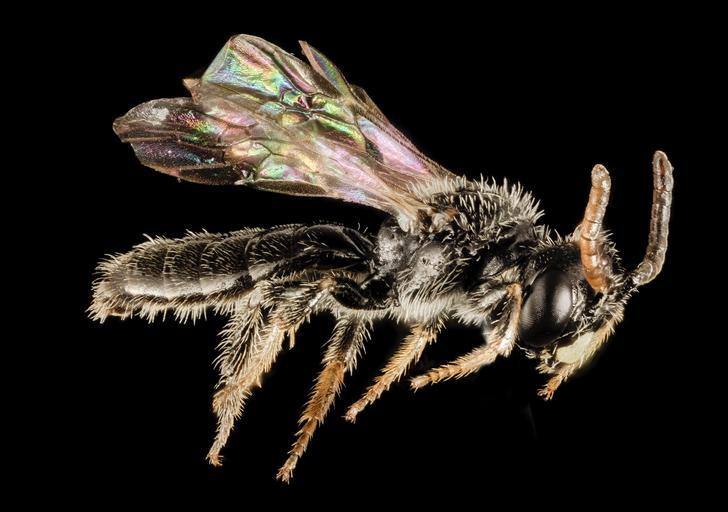MAKE A MEME
View Large Image

| View Original: | Panurginus_potentilla,_m,_side,_prince_georges_county_2015-05-06-06.49.23_ZS_PMax.jpg (5092x3583) | |||
| Download: | Original | Medium | Small | Thumb |
| Courtesy of: | www.flickr.com | More Like This | ||
| Keywords: bee bees andrenidae panurginus hymenoptera panurginus potentilla panurginuspotentilla taxonomy:binomial=panurginus potentilla taxonomy:binomial=panurginuspotentilla colony specialist cinquefoil potentilla prince george's county princegeorgescounty nesting tiny male droege biml usgs photo macro stacked shot stackedshot stackshot black background animal A tiny tiny bee, a specialist on Potentilla or Cinquefoil plants in North America. This one came from a colony I discovered in a dirt patch right in the front lawn of our laboratory. These sorts of bare dirt / clay / sand areas are often great bee nesting sites. This particular one is full of nesting Andrena, their nests parasites Nomada and a few days ago the first Maryland record for Melecta pacifica. ~~~~~~~~~~{{{{{{0}}}}}}~~~~~~~~~~ All photographs are public domain, feel free to download and use as you wish. Photography Information: Canon Mark II 5D, Zerene Stacker, Stackshot Sled, 65mm Canon MP-E 1-5X macro lens, Twin Macro Flash in Styrofoam Cooler, F5.0, ISO 100, Shutter Speed 200 Beauty is truth, truth beauty - that is all Ye know on earth and all ye need to know " Ode on a Grecian Urn" John Keats You can also follow us on Instagram account USGSBIML Want some Useful Links to the Techniques We Use? Well now here you go Citizen: Basic USGSBIML set up: www.youtube.com/watch?v=S-_yvIsucOY USGSBIML Photoshopping Technique: Note that we now have added using the burn tool at 50% opacity set to shadows to clean up the halos that bleed into the black background from "hot" color sections of the picture. www.youtube.com/watch?v=Bdmx_8zqvN4 PDF of Basic USGSBIML Photography Set Up: ftp://ftpext.usgs.gov/pub/er/md/laurel/Droege/How%20to%20Take%20MacroPhotographs%20of%20Insects%20BIML%20Lab2.pdf Google Hangout Demonstration of Techniques: plus.google.com/events/c5569losvskrv2nu606ltof8odo or www.youtube.com/watch?v=4c15neFttoU Excellent Technical Form on Stacking: www.photomacrography.net/ Contact information: Sam Droege sdroege@usgs.gov 301 497 5840 A tiny tiny bee, a specialist on Potentilla or Cinquefoil plants in North America. This one came from a colony I discovered in a dirt patch right in the front lawn of our laboratory. These sorts of bare dirt / clay / sand areas are often great bee nesting sites. This particular one is full of nesting Andrena, their nests parasites Nomada and a few days ago the first Maryland record for Melecta pacifica. ~~~~~~~~~~{{{{{{0}}}}}}~~~~~~~~~~ All photographs are public domain, feel free to download and use as you wish. Photography Information: Canon Mark II 5D, Zerene Stacker, Stackshot Sled, 65mm Canon MP-E 1-5X macro lens, Twin Macro Flash in Styrofoam Cooler, F5.0, ISO 100, Shutter Speed 200 Beauty is truth, truth beauty - that is all Ye know on earth and all ye need to know " Ode on a Grecian Urn" John Keats You can also follow us on Instagram account USGSBIML Want some Useful Links to the Techniques We Use? Well now here you go Citizen: Basic USGSBIML set up: www.youtube.com/watch?v=S-_yvIsucOY USGSBIML Photoshopping Technique: Note that we now have added using the burn tool at 50% opacity set to shadows to clean up the halos that bleed into the black background from "hot" color sections of the picture. www.youtube.com/watch?v=Bdmx_8zqvN4 PDF of Basic USGSBIML Photography Set Up: ftp://ftpext.usgs.gov/pub/er/md/laurel/Droege/How%20to%20Take%20MacroPhotographs%20of%20Insects%20BIML%20Lab2.pdf Google Hangout Demonstration of Techniques: plus.google.com/events/c5569losvskrv2nu606ltof8odo or www.youtube.com/watch?v=4c15neFttoU Excellent Technical Form on Stacking: www.photomacrography.net/ Contact information: Sam Droege sdroege@usgs.gov 301 497 5840 | ||||